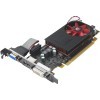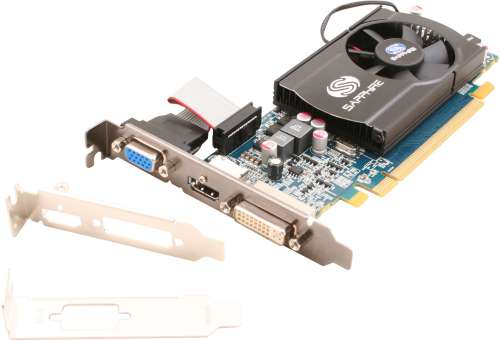- Qualcomm Launches Snapdragon 4 Gen 2 Mobile Platform
- AMD Launches Ryzen PRO 7000 Series Mobile & Desktop Platform
- Intel Launches Sleek Single-Slot Arc Pro A60 Workstation Graphics Card
- NVIDIA Announces Latest Ada Lovelace Additions: GeForce RTX 4060 Ti & RTX 4060
- Maxon Redshift With AMD Radeon GPU Rendering Support Now Available
ATI Radeon HD 5570 – Sub-$100 HTPC & Gaming Solution

AMD’s clear goal at the moment is to finish rounding-off its HD 5000-series line-up in advance of NVIDIA’s Fermi launch, and so far, it’s doing a good job. It’s continuing its success in this goal with the release of the $80 Radeon HD 5570, a card that’s designed to offer stellar media capabilities along with reasonable gaming performance.
Page 11 – Final Thoughts
The fact that I’m writing yet another conclusion to an ATI HD 5000-series card review is just mind-blowing, and to think… I’m not quite done. The HD 5830 card will be here before we know it, and you can tell that AMD is doing everything it can to make sure it completes its entire line-up before NVIDIA’s Fermi gets here. And with what we’ve been seeing lately, I think it’s safe to say that AMD is secure for a little while at many different price-points.
Compared to the GT 220, which AMD specifically targets this card toward, the differences are clear as day. The HD 5570 is the far superior card, it goes without saying. It’s much, much faster in all tests, and not to mention its performance/watt ratio is superb. No question, the HD 5570 is a great card, and it fits in perfectly at its price-point.
I have a hard time comparing the HD 5570 to the GT 220 like AMD does, though, because the company is basing pricing off of SRP’s, not fact. Currently, GT 220’s can be had for as low as $65, whereas the HD 5570 will start at $80. In this comparison, the HD 5570 would get our definite approval. But the other comparison is with the GT 240, which has an actual retail price of around $90… about ten bucks more than the HD 5570.
From a raw performance perspective, the GT 240 is the clear winner, having surpassed the HD 5570’s performance in all of our tests. According to 3DMark, the GT 220 is about 22% faster than the HD 5570, and while not much, it should be noted. For fun, let’s say the HD 5570 costs the exact same as the GT 240, which it pretty much does. From that perspective, one provides better gaming than the other.
To be fair to AMD though, the “good” vendor GT 240’s are mostly priced well with the help of mail-in rebates, whereas the HD 5570 should retail for a cool $80 without such a thing. But aside from raw performance, where does the HD 5570 pull out ahead? For one, it consumes less power, but again, it seems to scale with the total performance. Second, it offers things like DirectX 11 and also Eyefinity multi-monitor technology.
The absolute largest difference, though, is the actual size of the card. The HD 5570 is of a very low-profile form-factor, while the GT 240, as you can see in the middle of this photograph is rather huge by comparison. For the ultimate in HTPC use, the HD 5570 wins hands-down, as it takes up far less room – almost half, and perhaps even less overall volume if you consider the GPU cooler.
Both the GT 240 and HD 5570 have their benefits, but I’d still be swayed more towards the AMD camp, primarily for the fact that the card takes up much less room, which will result in you being able to use an even smaller chassis than what you may have been planning. For raw gaming performance, though, the GT 240 still comes out ahead, and if you don’t mind using mail-in rebates, you can get the card for the same price as the HD 5570, or even less. Just bear in mind you’d be investing in older technology, and losing support like DirectX 11. Hopefully with all this in mind, you can pick your next perfect HTPC/low-end gaming card.
Discuss this article in our forums!
Have a comment you wish to make on this article? Recommendations? Criticism? Feel free to head over to our related thread and put your words to our virtual paper! There is no requirement to register in order to respond to these threads, but it sure doesn’t hurt!
Support our efforts! With ad revenue at an all-time low for written websites, we're relying more than ever on reader support to help us continue putting so much effort into this type of content. You can support us by becoming a Patron, or by using our Amazon shopping affiliate links listed through our articles. Thanks for your support!






